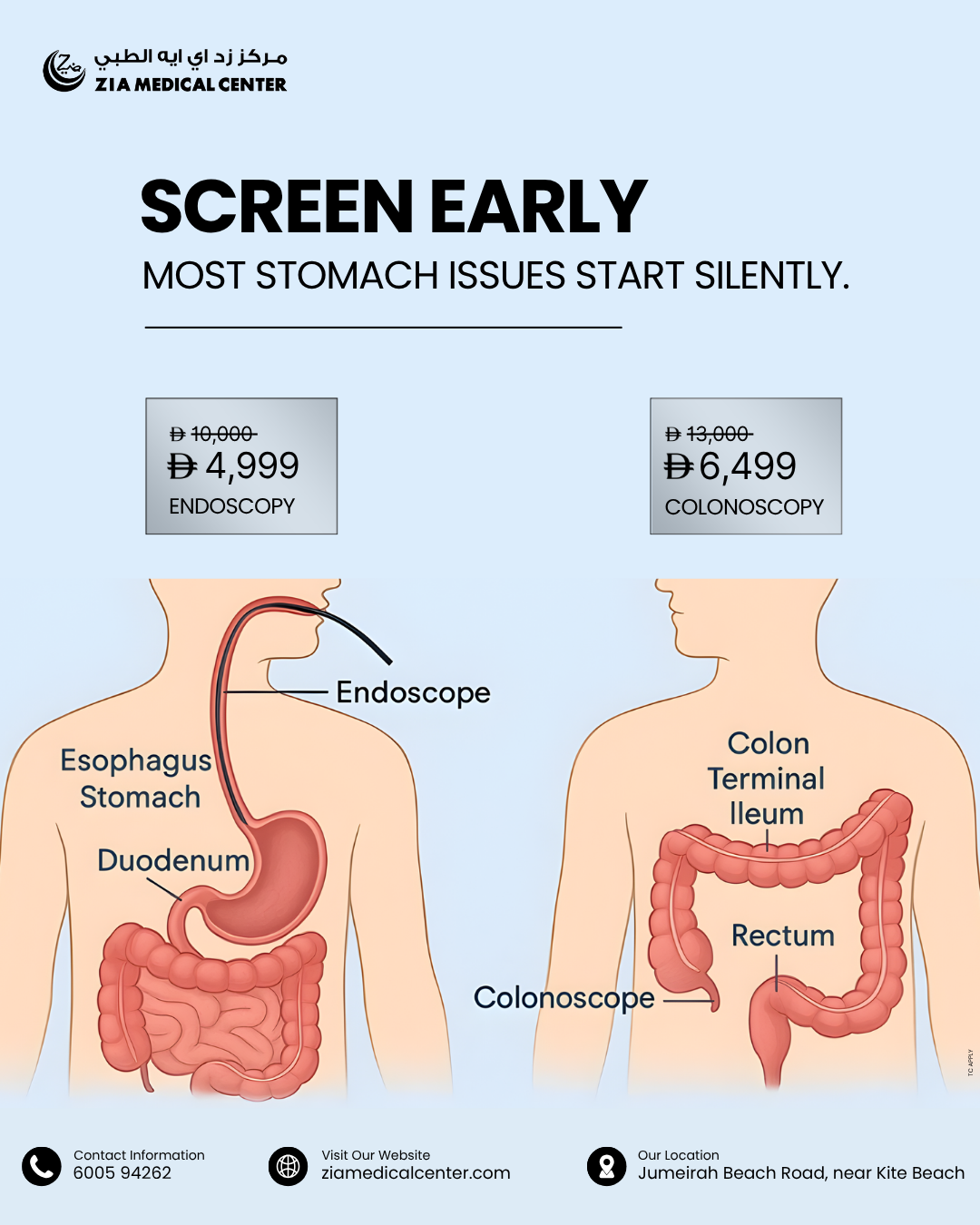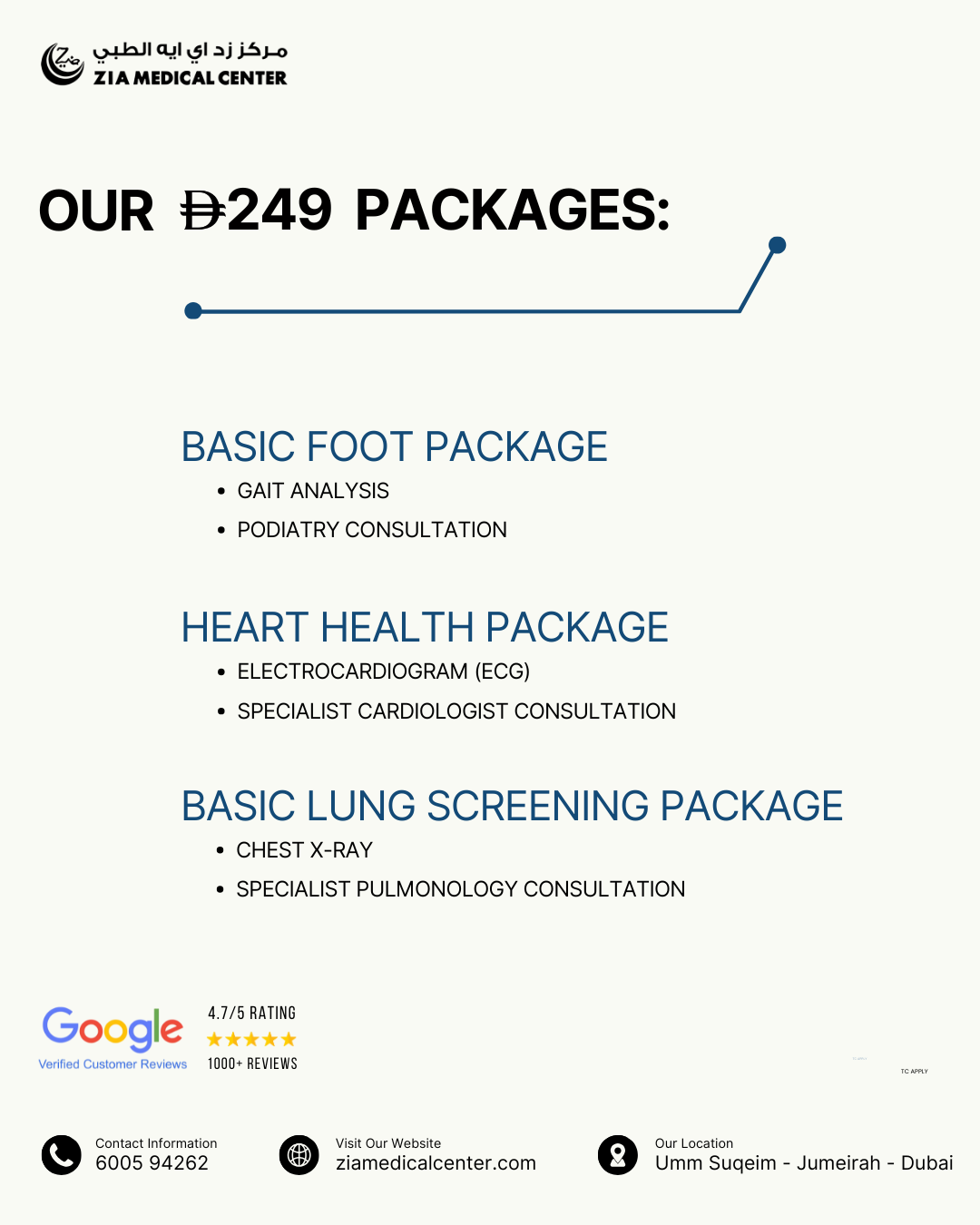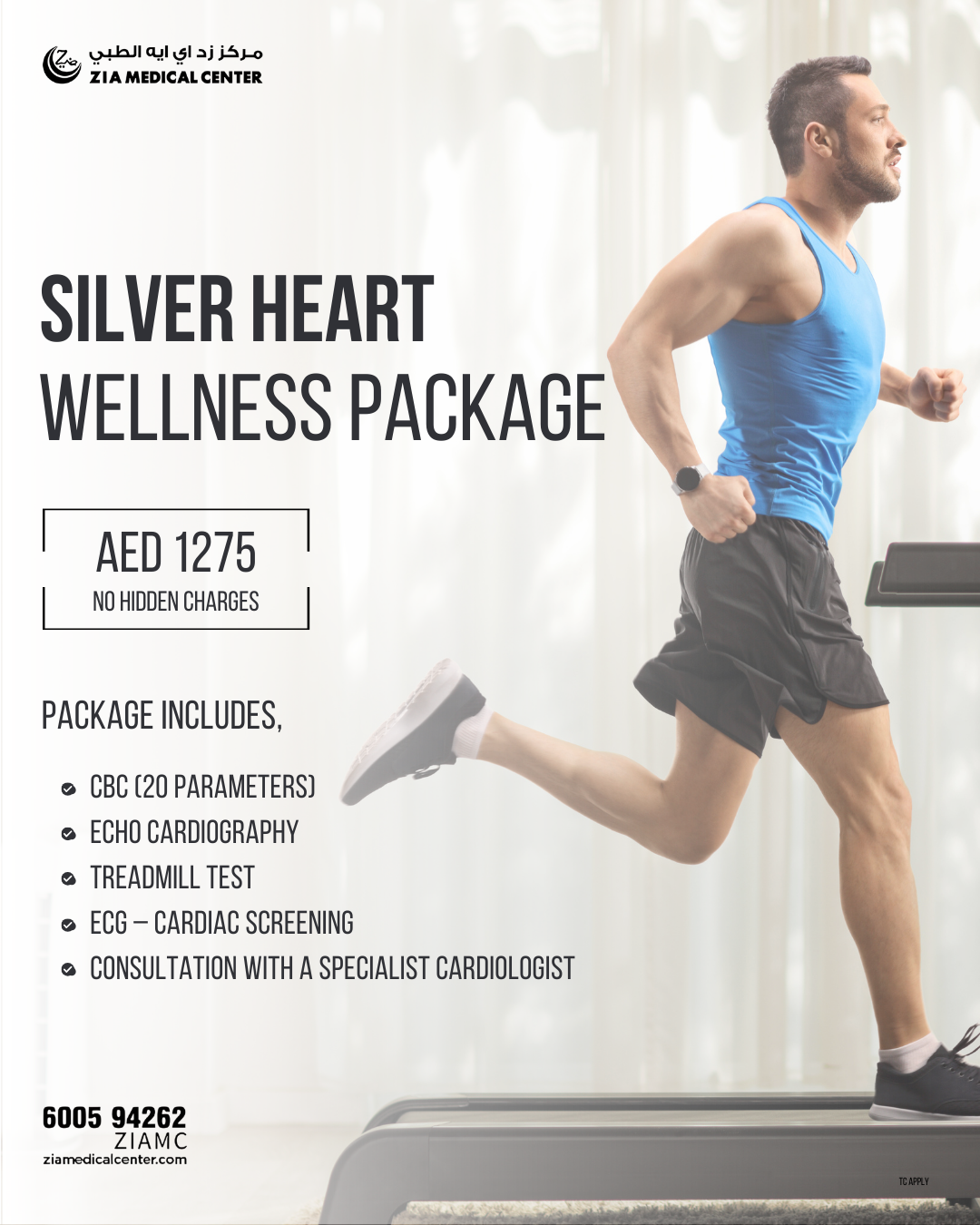Description
Endoscopy & Colonoscopy.
At Zia Medical Center in Dubai, endoscopy and colonoscopy are two of the most important tools we use to investigate and treat digestive problems. Both are minimally invasive tests that use a flexible tube with a camera, but they examine different parts of the digestive system and are recommended for different symptoms.
-
Endoscopy (gastroscopy) looks at the esophagus, stomach and upper small intestine and is often used for symptoms such as acidity, reflux, upper abdominal pain or suspected ulcers.
-
Colonoscopy examines the colon and rectum and is usually recommended for colorectal cancer screening, rectal bleeding, change in bowel habits or long-standing constipation/diarrhea.
Our experienced gastroenterologists at Zia Medical Center in Dubai use advanced endoscopy systems, gentle sedation protocols and strict safety standards to make the experience as comfortable and accurate as possible. In many cases, diagnosis, biopsy and treatment can be done in the same session.
What is Endoscopy? (Gastroscopy)
Endoscopy at Zia Medical Center in Dubai refers mainly to upper GI endoscopy, also known as gastroscopy. During this procedure, a thin, flexible tube with a camera at the tip is passed gently through the mouth to examine:
-
Esophagus
-
Stomach
-
First part of the small intestine (duodenum)
When do our doctors recommend an Endoscopy?
Your gastroenterologist at Zia Medical Center may suggest an upper endoscopy if you have:
-
Persistent heartburn or acid reflux
-
Upper abdominal or epigastric pain
-
Difficulty or pain while swallowing (dysphagia / odynophagia)
-
Unexplained nausea or vomiting
-
Suspected gastric or duodenal ulcers
-
Long-standing bloating or indigestion
-
Unexplained weight loss or anemia
Endoscopy allows the doctor to:
-
See the lining of the upper digestive tract in real time
-
Take biopsies (small tissue samples) if needed
-
Test for H. pylori infection
-
Treat bleeding areas or narrowings in selected cases
Most endoscopy procedures at Zia Medical Center, Dubai take about 10–20 minutes, are performed under light conscious sedation, and patients usually go home the same day.
What is Colonoscopy?
A colonoscopy is a specialized endoscopic procedure used to examine the:
-
Rectum
-
Entire colon (large intestine)
-
In some cases, the terminal ileum (last portion of the small intestine)
A flexible colonoscope with a high-definition camera is inserted gently through the rectum so our specialist can view the inner lining of the bowel, remove polyps and take biopsies where necessary.
Why is Colonoscopy important?
At Zia Medical Center, colonoscopy is routinely performed to:
-
Screen for colorectal cancer, especially from age 45 onwards
-
Investigate rectal bleeding (fresh blood or blood mixed in stool)
-
Evaluate chronic constipation or diarrhea
-
Assess unexplained abdominal pain or bloating
-
Investigate iron-deficiency anemia when the cause is unclear
-
Monitor Inflammatory Bowel Disease (IBD) such as ulcerative colitis or Crohn’s colitis
One of the biggest advantages of colonoscopy is that precancerous polyps can be removed immediately, significantly reducing the risk of colorectal cancer.
Procedures are usually done under moderate to deep sedation, take about 30–60 minutes, and are followed by a short recovery period in our day-care unit.
Endoscopy vs Colonoscopy: What’s the Difference?
Although they use similar technology, endoscopy and colonoscopy are designed for different regions and symptoms.
Endoscopy (Upper GI)
-
Examines: Esophagus, stomach, duodenum
-
Entry point: Through the mouth
-
Typical symptoms:
-
Heartburn, reflux
-
Upper abdominal pain
-
Difficulty swallowing
-
Persistent nausea/vomiting
-
Colonoscopy (Lower GI)
-
Examines: Rectum and colon
-
Entry point: Through the anus
-
Typical symptoms:
-
Rectal bleeding
-
Change in bowel habits
-
Chronic constipation or diarrhea
-
Unexplained weight loss or anemia
-
At Zia Medical Center, the choice between endoscopy and colonoscopy is based on where your symptoms are coming from and your age, risk factors and medical history. In some cases, both procedures may be advised for a complete digestive evaluation.
Why are Endoscopy & Colonoscopy so Important for Digestive Health?
For many conditions, blood tests and ultrasound are not enough. Endoscopy and colonoscopy allow our doctors to:
-
See the actual lining of your digestive tract in detail
-
Take targeted biopsies to confirm or rule out disease
-
Treat problems during the same session (e.g., remove polyps, control bleeding)
These procedures play a key role in:
-
Detecting gastritis, ulcers and Barrett’s esophagus
-
Diagnosing celiac disease, H. pylori infection
-
Identifying and removing colon polyps before they turn cancerous
-
Diagnosing and monitoring colorectal cancer, IBD and other serious conditions
Early detection often means simpler treatment, better outcomes and fewer complications.
Which Organs Do Endoscopy and Colonoscopy Examine?
Endoscopy (Gastroscopy)
-
Esophagus – checking for inflammation, reflux damage, Barrett’s esophagus, strictures
-
Stomach – assessing gastritis, ulcers, polyps or tumors
-
Duodenum – evaluating celiac disease, ulcers and other upper small bowel disorders
Colonoscopy
-
Rectum & colon – rectum, sigmoid, descending, transverse, ascending colon and cecum
-
Sometimes extends into the terminal ileum if small bowel involvement is suspected
Together, endoscopy and colonoscopy allow our gastroenterologists at Zia Medical Center to examine almost the entire digestive tract from mouth to large intestine.
Symptoms That May Need Endoscopy or Colonoscopy
You may need an Endoscopy if you have:
-
Heartburn or acid reflux lasting more than a few weeks
-
Burning or pain in the upper abdomen
-
Difficulty swallowing food or feeling food “sticking”
-
Unexplained nausea, vomiting or early fullness
-
History of ulcers or suspected H. pylori infection
-
Long-standing indigestion not responding to medication
You may need a Colonoscopy if you have:
-
Blood in the stool or bleeding from the rectum
-
Loose motions or diarrhea lasting more than 3–4 weeks
-
New or worsening constipation
-
Narrow, pencil-thin stools
-
Persistent bloating or lower abdominal cramps
-
Unexplained iron-deficiency anemia
-
Strong family history of colon or rectal cancer
If your symptoms are not clearly “upper” or “lower”, our gastroenterologist in Dubai will assess you in detail and recommend the most appropriate test—or both, if needed.
How Endoscopy is Performed
-
Pre-assessment
Your doctor reviews your symptoms, medical history and medications. You will be given clear instructions about fasting and which medicines to adjust. -
Fasting
For endoscopy in Dubai, you’ll usually need to fast for 6–8 hours so the stomach is empty. -
Sedation & throat preparation
A mild sedative is given through a vein to help you relax. A local anesthetic spray may be used to reduce the gag reflex. -
Procedure
The endoscope is gently passed through the mouth and guided into the esophagus, stomach and duodenum. The doctor examines the lining on a high-resolution monitor. Biopsies may be taken if needed. -
Recovery
After endoscopy, you’ll rest in our recovery area for 30–60 minutes. Most patients can go home the same day with a companion. -
Results & follow-up
Your doctor will discuss the main findings on the same day. Biopsy results, if taken, are usually available within a few days, followed by a treatment plan.
How Colonoscopy is Performed
-
Consultation & planning
The gastroenterologist explains why a colonoscopy in Dubai is recommended, reviews your history and checks your fitness for sedation. -
Bowel preparation
You’ll receive detailed instructions and a bowel preparation plan (usually a laxative solution) to completely cleanse the colon the day before the procedure. A clear liquid diet is typically advised. -
Sedation
On the day of the colonoscopy, you’ll receive moderate or deep sedation so you stay comfortable and usually do not remember the procedure. -
Procedure
The colonoscope is inserted through the rectum and gently advanced through the colon. The doctor examines each segment carefully, removes polyps when found and may take biopsies from any suspicious area. -
Recovery
After the procedure, you’ll rest in the recovery area for about 60–90 minutes. Some bloating or gas is common and settles quickly. -
Report & next steps
You’ll receive an explanation of the findings before discharge. If polyps or biopsies were taken, your doctor will advise when you should return and when the next colonoscopy is likely to be needed.
How Safe Are Endoscopy & Colonoscopy?
Endoscopy and colonoscopy are performed by experienced gastroenterologists using strict safety protocols.
Common, mild effects
-
Temporary bloating or gas
-
Mild throat soreness after endoscopy
-
Short-lived abdominal cramps after colonoscopy
These usually settle within hours.
Rare but serious risks
-
Bleeding, especially after polyp removal or biopsy
-
Perforation (tiny tear) in the wall of the digestive tract
-
Sedation-related complications in high-risk patients
Our team minimizes these risks by:
-
Careful pre-procedure assessment
-
Using modern equipment and proven techniques
-
Working according to international endoscopy safety guidelines
-
Monitoring you closely before, during and after the procedure
In almost all cases, the benefits of early diagnosis and prevention far outweigh the small risks.
Cost & Insurance for Endoscopy & Colonoscopy at Zia Medical Center, Dubai
The cost of endoscopy and colonoscopy in Dubai depends on:
-
Type of procedure (endoscopy, colonoscopy or both)
-
Whether biopsies or polyp removal are required
-
Sedation type
-
Insurance coverage and policy details
At Zia Medical Center:
-
We offer transparent, pre-approved packages for endoscopy and colonoscopy in Dubai
-
Our insurance team helps you check coverage and pre-authorization before the procedure
-
Self-pay patients can benefit from package pricing with clear inclusions
For the latest Endoscopy Dubai price and Colonoscopy Dubai price, you can refer to this page’s package section or contact our call center and WhatsApp support.
Can Endoscopy and Colonoscopy Be Done on the Same Day?
Yes. In selected patients, we can perform both endoscopy and colonoscopy on the same day under a single sedation session. This is especially useful when:
-
You have unclear or combined upper and lower GI symptoms
-
There is unexplained anemia or suspected hidden bleeding
-
You want a complete digestive check-up in one visit
Our doctor will decide if a same-day combined endoscopy and colonoscopy is suitable for you based on your health status, symptoms and insurance approval.
Who Should Have Routine Colonoscopy Screening?
Routine colonoscopy screening is recommended for:
-
All adults from age 45 (average risk, no symptoms)
-
Adults earlier than 45 if:
-
You have a family history of colon or rectal cancer
-
You’ve had polyps in the past
-
You live with inflammatory bowel disease
-
You have a hereditary cancer syndrome
-
Your Zia Medical Center gastroenterologist will personalize how often you need colonoscopy—every 3, 5 or 10 years—depending on your findings and risk profile.
How Our Gastroenterologists Decide Which Test You Need
The decision between endoscopy vs colonoscopy is based on a structured clinical assessment:
-
Upper symptoms → more likely to need endoscopy
-
Lower bowel symptoms or bleeding → more likely to need colonoscopy
-
Unclear anemia, weight loss or complex symptoms → sometimes both are advised
We also consider your:
-
Age and family history
-
Medication use (especially blood thinners)
-
Existing medical conditions
This ensures you get the right test, at the right time, without unnecessary procedures.
How to Prepare Physically and Mentally
Physical preparation
-
Follow fasting instructions exactly for endoscopy
-
Follow the bowel prep and clear liquid diet instructions carefully for colonoscopy
-
Inform your doctor about all medications, especially:
-
Blood thinners
-
Diabetes medications
-
Heart or blood pressure medications
-
Mental preparation
-
Remember: these procedures are routine, safe and preventive
-
Understand that the goal is clarity and peace of mind
-
Bring a family member or friend for support and to accompany you home
-
Prepare your questions in advance (see below)
Questions You Can Ask
You are always encouraged to ask:
-
Why do I need endoscopy or colonoscopy?
-
What exactly will you be looking for?
-
Which sedation will you use?
-
Do I need to stop or adjust any medicines?
-
Will you take biopsies or remove polyps if you see them?
-
When and how will I get my results?
-
When should I repeat this test in the future?
Our team takes time to explain everything clearly so you feel informed and comfortable.
Lifestyle, Diet & Stress – Do They Matter?
Yes. Many people in Dubai experience digestive symptoms related to diet, lifestyle and stress, such as:
-
High intake of fried and spicy foods
-
Irregular meal timings
-
Low fibre intake
-
Sedentary lifestyle
-
High stress and anxiety
Sometimes endoscopy or colonoscopy is done to rule out serious disease, and results are normal. In such cases, your doctor at Zia Medical Center will guide you on:
-
Diet changes
-
Lifestyle modifications
-
Stress management strategies
So even when scopes are normal, they still help by excluding dangerous conditions and focusing treatment on what truly matters for your health.
Endoscopy & Colonoscopy in Dubai at Zia Medical Center: Take the Next Step
If you have ongoing digestive symptoms, are above 45, or have a family history of colorectal cancer, don’t ignore the warning signs.
At Zia Medical Center on Jumeirah Beach Road in Dubai, our gastroenterology team offers:
-
Endoscopy in Dubai for upper GI issues
-
Colonoscopy in Dubai for colon and rectal conditions
-
Same-day, combined endoscopy and colonoscopy in selected cases
-
Clear guidance on costs, insurance and preparation
You can book your appointment or request more information through:
-
Call center
-
WhatsApp
-
Online enquiry form on this website
Early screening is one of the most powerful steps you can take to protect your digestive health.
We’re here to make that step simple, safe and reassuring.




